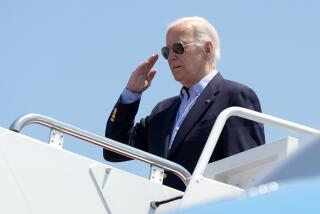China Hopes to Boost Good Ties
China is happy with President Bush’s reelection. And it likes the U.S. signals it’s getting on Taiwan. But it’s also looking for assurance that the next four years will be marked by a bit more global cooperation and a bit less of America going it alone.
That’s the word from Beijing as Bush and Chinese President Hu Jintao prepare to meet today on the sidelines of the Asia-Pacific regional economic forum in Chile.
China generally welcomes the continuity that a second Bush term affords because it knows what to expect, analysts say. Also, in the last four years it has seen Sino-U.S. relations improve dramatically and appreciates the president’s moves to downplay human rights, labor and trade imbalance issues.
But it will also be looking for signs of where America’s foreign policy is headed in the wake of Secretary of State Colin L. Powell’s decision to resign. The incoming secretary, Condoleezza Rice, is seen as more in lock-step with Bush on foreign affairs, and that’s not necessarily a good thing in Beijing’s eyes.
“China is a bit worried about the direction of American foreign policy, especially [amid] Powell’s departure,” said Wang Yiwei, who specializes in U.S. studies at Fudan University in Shanghai. “They worry that America is turning away from globalization and are concerned that America’s foreign policy is too unilateral, a bit too tough.”
China’s biggest priority is Taiwan. At the conference this weekend, President Hu will be looking closely for hints of change in American thinking about the island, which split from China in 1949 as the Communists took power but which Beijing regards as a part of its territory.
The U.S. has maintained a studied ambiguity on the subject, though Powell’s statements late last month that Taiwan was not a sovereign entity were welcomed by China’s leadership. But many Chinese analysts were left wondering how much of the comments reflected Powell’s personal view and how much was administration thinking. Beijing remains extremely wary of any move by Taipei to formally declare its independence.
Like Bush, Hu has strengthened his domestic position since the last time the leaders met. Hu is hoping to add to the chemistry and working relationship between them, encourage regular phone calls and otherwise ensure that Sino-U.S. relations are elevated to a higher plane.
“There will be an emphasis on how the leaders communicate over the next four years,” said Tang Xiaosong, a professor at the Guangdong University of Foreign Studies. “That’s the focus, rather than any big step or breakthrough.”
On the economic side, Hu may express his appreciation to Bush for rejecting sanctions against China over currency issues, analysts say. American companies and labor unions have called for China to revalue its currency, arguing that that will partially compensate for what they see as its unfair cost advantage.
China counters that its currency is not yet ready to float freely given China’s weak banking sector and state-owned industries. Bush has opted not to make it a major bilateral issue.
More to Read
Sign up for Essential California
The most important California stories and recommendations in your inbox every morning.
You may occasionally receive promotional content from the Los Angeles Times.






